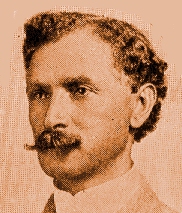
When first asked by Lewis Shepherd to join the team that would defend Ed Johnson, forty-one-year old Noah Parden declined. The divisive, emotionally charged case could only hurt the legal practice built up over thirteen years by Chattanooga's most successful black attorney. Instead, Parden agreed to play a behind-the-scenes role, tracking down alibi witnesses and investigating Johnson's character for his three attorneys of record. This work convinced Parden that Johnson was an innocent man. Parden began visiting Johnson in jail, offering what encouragement he could.
After Johnson's conviction and the announcement by W. G. M. Thomas that Johnson would not appeal his death sentence, Johnson's father visited Parden to seek his help in mounting an appeal. Knowing that to take the case would make him a pariah in Chattanooga's legal world, Parden initially rejected the request, then changed his mind at the insistence of his law partner, Styles Hutchins. Once on the case, Parden dedicated himself wholeheartedly to the cause of Johnson's defense. Parden and Hutchins--with no expectation of being paid for their work--appealed Johnson's conviction to the Tennessee Supreme Court and, when that effort failed, unsuccessfully petitioned for a writ of habeas corpus in federal district court. With time running out on their client, Parden worked practically nonstop--napping on his office floor for an hour or two a night--as he worked to prepare an appeal to the United States Supreme Court. Two days before Johnson's scheduled execution, Parden pressed Johnson's case in a hearing before Justice John Marshall Harlan, finally winning a short-lived victory for his unfortunate client. The Court order in the Johnson case listed Parden as lead counsel, making Parden the first black man ever to be so designated in a case before the U. S. Supreme Court.
After the lynching of Ed Johnson, Parden provided Secret Service agents with valuable background information. Over a period of three days, Parden led agents to witnesses that might help build a prosecution case against the conspirators. When witnesses were reluctant to talk, Parden used his considerable persuasive powers to gain their cooperation. Later, Parden would travel to Washington to advise Attorney General Bonaparte and other government lawyers on how to proceed with the prosecution.
Life became difficult in Chattanooga for Noah Parden. His public call to "now seek punishment against those who violated the laws of our state and country" led to several threats against his life. No one wanted to hire a lawyer hated by the local judge. His office had been set on fire and his home stoned. Parden came to the conclusion that that he had no choice but to flee town. He never returned.
When Shipp and other defendants received their sentences in November of 1909, Parden was asked to comment on the High Court's action. He said:
The very rule of law upon which our country was founded and on which the future of this nation rests has been enforced with the might of our highest tribunal. We are at a time when many of our people have abandoned the respect for the rule of law due to the racial hatred deep in their hearts and souls, and nothing less than our civilized society is at stake.
There is no memorial in Chattanooga to the intelligent, pious, and hardworking African-American attorney who took on Ed Johnson's appeal at great personal cost--but there should be.
